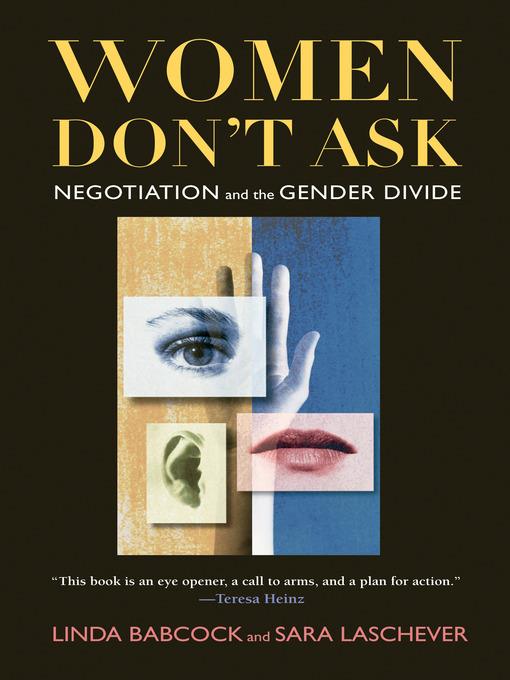
Women Don't Ask
Negotiation and the Gender Divide
کتاب های مرتبط
- اطلاعات
- نقد و بررسی
- دیدگاه کاربران
نقد و بررسی

July 21, 2003
Babcock and Laschever, contrary to their book's title, do ask a series of questions: Why do most women see a negotiation as an automatic fight instead of a chance to get what they deserve? Why are women afraid to ask for what they want in the workplace? And perhaps most importantly, why don't women feel entitled to ask for it? True to their academic backgrounds, Babcock (a Carnegie Mellon economist) and writer Laschever seek their answers in a series of gender psychology and economics studies (some done by them, most done by others). They cite numerous studies indicating that women are socialized to feel pushy and overbearing if they pursue their ideal situation when it spells potential conflict with employers or co-workers. The authors also use anecdotal evidence to support their claim that women are taught to feel like every negotiation is a monumental threat to a personal relationship, rather than a fact of business life (the view held by most men, they say). Their argument has important practical ramifications: the authors cite one study that estimates "a woman who routinely negotiates her salary increases will earn over one million dollars more by the time she retires than a woman who accepts what she's offered every time without asking for more." Babcock and Laschever's work is a great resource for anyone who doubts there is still a great disparity between the salary earnings of men and women in comparable professions. Alas, it isn't as successful at eloquence as it is at academic rigor.(Oct.)Forecast:Academics and feminists will eat this up, while casual readers may be less motivated to get through the dry text.

Starred review from October 1, 2003
In this well-documented study, Babcock (economics, Carnegie Mellon Univ.) and Laschever report that the feminist movement has not made the strides that many of us would like. The work asks why women in the workplace have such difficulty negotiating for themselves (as opposed to others). The reasons they see for this cultural timidity are many and varied: women are socialized to put others first and to devalue their own work; they are seen as negatively aggressive if they look out for their own interests; and they expect to be rewarded fairly for their efforts. The aim of their research is not to show women how to negotiate like men but rather to describe how the gender divide is still deeply entrenched in our culture. They have determined that women can achieve more if they would recognize their needs and ask for them. After an extensive discussion of these situations, the authors examine those instances of women's uniquely successful negotiating skills and their overall benefits to organizations and society, such as the abilities to see past two options and to create value through collaboration. The final chapter almost appears as an afterthought, though the points are well taken. They discuss women's negotiating skills in terms of home life, stress, heart disease, and AIDS in just a few pages. Neither a dry academic treatise nor a self-help book, this work puts forth a model for a society that respects women's communication strengths. Strongly recommended for public and all academic libraries.-Margaret Cardwell, Christian Brothers Univ. Lib., Memphis
Copyright 2003 Library Journal, LLC Used with permission.

October 15, 2003
Women, the authors tell us, don't ask for what they want and need because of socialized behavior: from business, where they don't ask for raises, promotions, and better opportunities, to the home, where they don't ask for help with family and housekeeping. After extensive research, the authors claim that women are less likely than men to use negotiation to improve their status--and all of society loses when they do not. The book examines how modern Western culture strongly discourages women from asking for what they need and offers suggestions for removing those barriers. In the workplace, individuals can be trained to stop taking a harder line with women, making adversarial ways of responding to and evaluating women less permissible; and women can be trained to ask as women, not mimicking the style of men. This thoughtful analysis could both benefit managers across industry lines and help women learn the importance of developing negotiating skills.(Reprinted with permission of Booklist, copyright 2003, American Library Association.)

























دیدگاه کاربران